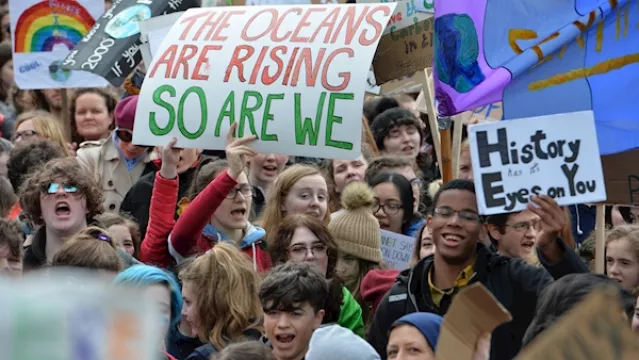With its long title, here's what the proposed new law means for school strikers, environmentalists, business owners and everyone else in Ireland.
What is it the Climate Action Bill?
The Climate Action Bill sets out proposed amendments to an existing law, the Climate Action and Low Carbon Development Act of 2015.
The bill puts into law a commitment for a carbon neutral economy in Ireland by the year 2050.
It aims to transform how the country deals with climate change by legally enforcing reductions in carbon emissions.
What does carbon neutral mean?
A carbon neutral economy means an economy where new greenhouse gas emissions do not exceed their removal through carbon-capture technology or carbon sinks such as bogs or forestry.
Is this bill really necessary?
With the world thrown into turmoil by the Covid-19 pandemic, scientists have stated that the complex effects of climate change and destruction of the environment have direct impact on the risk of infectious disease outbreaks and spread.
September 2020 was also recently confirmed as the warmest on record globally, another 0.05 degrees hotter than last year’s record-breaker. Scientists say this is a clear indication of temperatures being driven up by emissions from human activity.
How does the bill propose to achieve its carbon neutral 2050 target?
The bill sets out three five-year carbon budgets that set a cap or ceiling on the level of emissions permitted over that period.
The budget will be divided out between various economic sectors, such as transport, agriculture and local authorities.
These sectoral budgets are referred to as decarbonisation target ranges in the bill, and will impose legally-binding emission limits on sectors starting in 2021.
Who will decide the budgets?
The budgets will be produced by the Government of the year, with a strengthened and independent Climate Change Advisory Council proposing sectoral limits while an all-party Oireachtas Climate Action Committee provides oversight.
How will it affect me?
The long-term impact of the bill should a cleaner environment marked by less air pollution and a better quality of life for current and future generations.
Minister for Climate Eamon Ryan said the bill will change how we heat our homes, generate power, move around our country, grow our food and run our businesses.
As time goes on, those who persist with fossil fuel use, such as driving a diesel car or using home heating oil, will feel the hit of rising carbon taxes.
How will it affect jobs and businesses?
Every big business investment will now have to factor in its carbon footprint and be subject to a cap on carbon pollution, in sectors from building to agriculture.
There will be supports for a “just transition” process that assists workers whose jobs are no longer fit for purpose in a green economy, such as workers in retired power plants.
Is the bill the perfect solution for tackling Ireland’s contribution to climate change?
Cara Augustenborg, a fellow at the UCD Environmental Policy research group, has said it is unclear how the bill’s carbon budgets link to its 2050 climate neutrality target.
She also said the penalty for failing to meet decarbonisation targets remains uncertain.
We need regular carbon budgets, but it’s unclear how those budgets link to 2050 target & what the penalty is for failure to meet the overall budget or the sectoral decarbonisation ranges. Is a carbon budget or sectoral target any use if there’s no legal obligation to comply?
— Dr. Cara Augustenborg (@CAugustenborg) October 7, 2020
Another notable omission from the bill is a ban on diesel and petrol cars, as the Programme for Government committed to banning the registration of fossil-fuelled cars from 2030 onwards.
With questions surrounding implementation and enforcement of the targets that the bill sets out, time will tell if it ultimately leads Ireland to a transformed and climate neutral economy.







